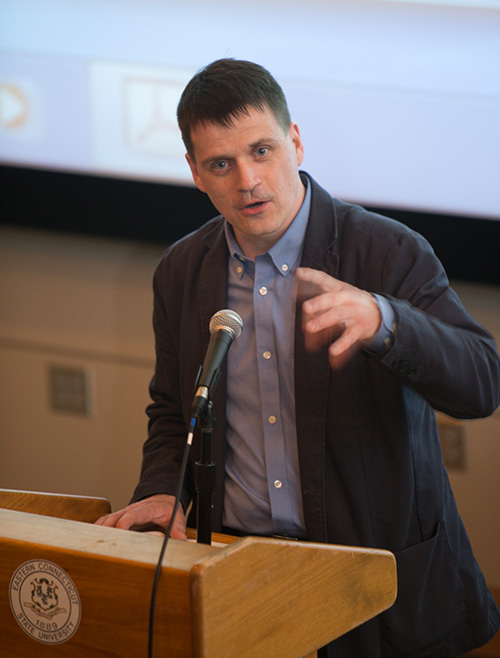- Apply
- Visit
- Request Info
- Give
Donaghy wins Auburn Witness Poetry Prize
Poetry award recognizes social justice and remembers Donaghy’s longtime friend
Written by Molly Boucher
Published on November 09, 2022

English professor Daniel Donaghy was recently honored by the “Southern Humanities Review” with its Auburn Witness Poetry Prize. The prize highlights a work that commemorates social justice and was created in memory of acclaimed author Jake Adam York, one of Donaghy’s longtime friends.
An award-winning poet and graduate of Auburn University, York dedicated his career to writing about social justice. His work explores the complexity of race relations in the South and the trials and successes of the civil rights movement. Donaghy’s poetry explores similar themes, as evidenced by his Witness Poetry Prize-winning poem “Tulsa Triptych,” which looks at one of the worst hate crimes in America’s history.
Growing up in inner-city Philadelphia, Donaghy never thought he would be making a career out of writing. “I went to Kutztown University, and I enrolled as a physics major but wasn't sure what I was going to do with my life. I didn't know the ins-and-outs of college. I didn't even know how to drop a class.”
His life, however, changed after taking a class with poetry professor Harry Hunes, an award-winning author who told Donaghy that his voice was important and that he had a story worth telling. “He would work with me through drafts of so many poems in his office hours. I can’t even guess how many. His attention, validation and friendship set me on the path I’m on today.”
Donaghy continued with English and poetry and went on to Cornell University to earn his master's in fine arts (MFA) degree. It was there that he met York, a fellow poet with similar life experience to him, in Cornell’s MFA Creative Writing (Poetry) program. “He was a steelworker’s son, and I was an electrician’s son on a campus of tremendous privilege, so I think we got each other on a level beyond just offering each other advice in writing class.” The two learned from each other and related in a way Donaghy felt that his other peers could not. They would continue to build on their respect for one another, and friendship, until York’s unexpected death in 2012.
“He was incredibly generous and encouraging while also being the smartest person I've ever had the pleasure of knowing,” said Donaghy. “I’d exchanged Facebook messages with him just days earlier, congratulating him on winning a (National Endowment for the Arts) fellowship in poetry. I got to tell him, for the first and last time, that I loved him.”
Donaghy’s poem, “Tulsa Triptych,” follows the African American lives in the North Tulsa neighborhood of Greenwood before, during and after the Tulsa Race Massacre, one of the most egregious hate crimes in American history. The poem was selected by this year’s Auburn Witness Poetry Prize judge Rick Barot.
“The story it tells is full of violence, which only reminds us that our story has always had that violence as a kind of fundament, up through the social and political calamities of recent years, recent months, and even recent days,” said Barot. “But more than just recovering a necessary story, ‘Tulsa Triptych’ is also an instance of canny formal presentation. Shifting from incantatory catalogue, focused scene, to bitter ekphrasis, the poem uses as many of the resources of poetry as it can—understandably and movingly so, given all that's at stake in the specific story it tells and the larger American story that it implicates.”
For Donaghy, the award is much more than a recognition of his work. “I’ll be forever thankful to judge Rick Barot, an essential poet whose work explores issues of identity, memory, and social justice, for allowing me to have this additional exchange with Jake even though he has passed.”
Throughout his career as both a poet and professor, Donaghy has taken inspiration from those who had a lasting influence on him, both personally and professionally. “I try to do at Eastern every day what Harry Hunes did for me: to help students recognize the power of their own voices and to help them to develop the tools they’ll need after they graduate.” In his career, Donaghy’s students have gone on to become successful teachers, editors, lawyers, journalists, and published authors.
Although he continues to be recognized for his poetry, Donaghy finds that teaching has presented him with an even greater gift of being able to explore language in all its forms. “I love teaching at Eastern. I have great colleagues, both in the English Department and across the campus, whose work and friendship continue to challenge and inspire me,” he said. “Working with students every day on their writing continually inspires my own. I tell my students all the time: ‘We’re all writers; I’ve just been doing this longer than you have. Let me share what I know and don’t know with you as you try to make your writing the best it can be, entering it into an artistic conversation with writers who’ve come before you.’”


